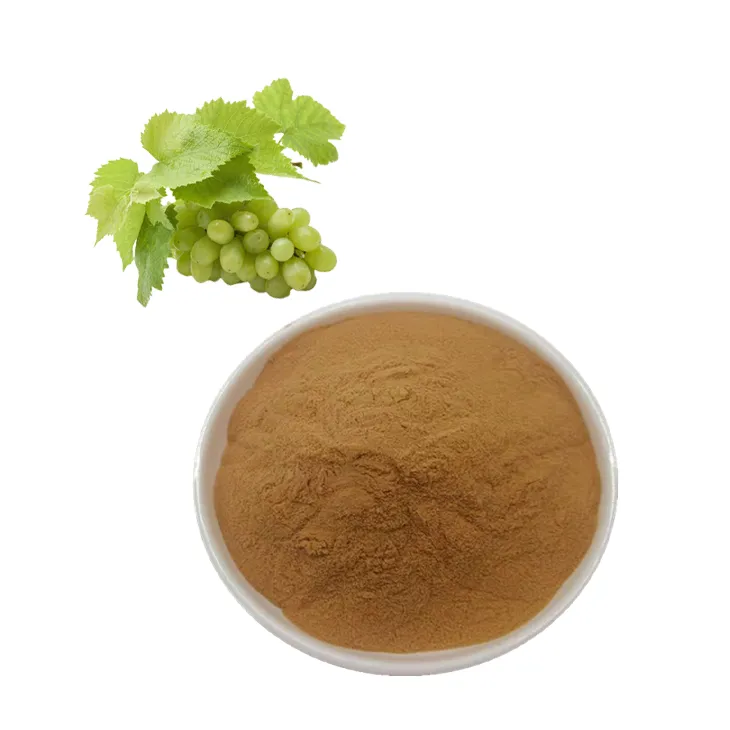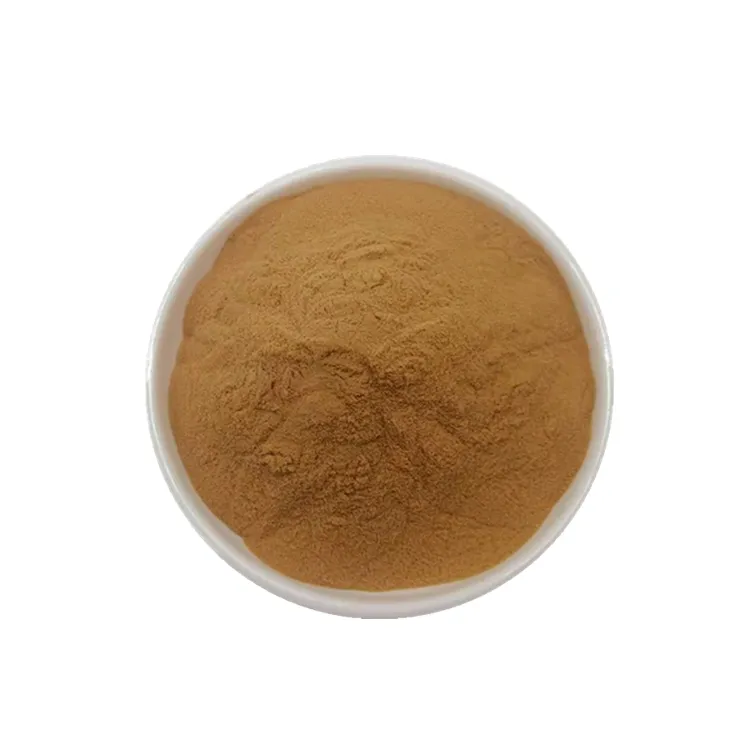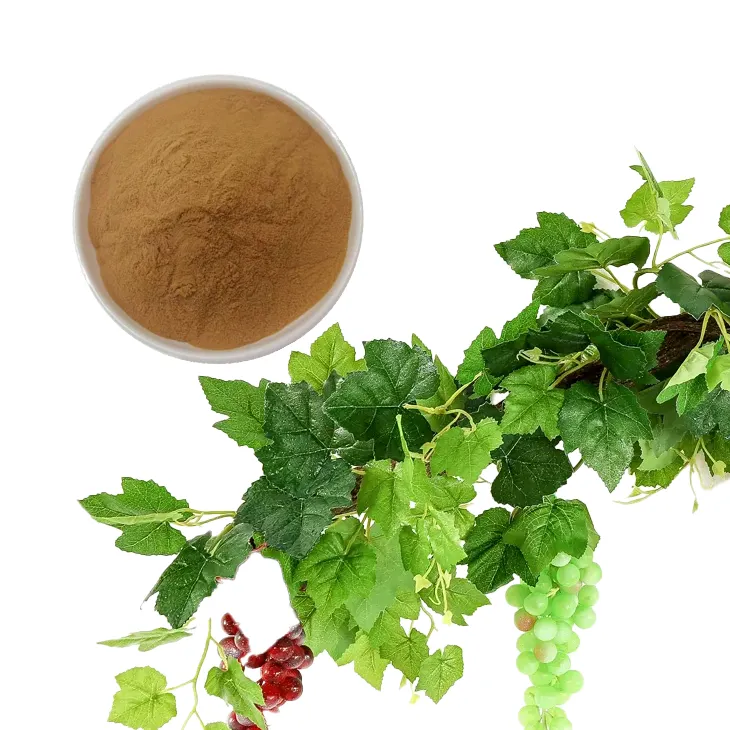- 0086-571-85302990
- sales@greenskybio.com
Certified Organic Grape Leaf Extract Kit.
2024-12-31

Introduction to Certified Organic Grape Leaf Extract
Certified organic Grape Leaf Extract sets are indeed a treasure trove of natural goodness. Grape leaves, which are often overlooked, are in fact a rich source of bioactive components. When these leaves are processed into extracts, they provide a concentrated form of these highly beneficial substances. The extraction process carefully isolates and preserves the valuable elements present in the grape leaves, making the extract a powerful natural product with a wide range of potential applications.

Versatility in the Pharmaceutical Industry
New Drug Development
One of the most significant advantages of these extract sets is their versatility, especially in the pharmaceutical industry. They can play a crucial role in the development of new drugs. The bioactive compounds found in Grape Leaf Extracts may possess unique pharmacological properties that can be harnessed for medicinal purposes. For example, some components might interact with specific cellular receptors or biochemical pathways in the body, providing a basis for the creation of novel therapeutics.Complementary Medicine
Additionally, grape leaf extracts can be used as complementary medicine. In the treatment of chronic conditions such as diabetes or hypertension, the natural compounds present in the extract may offer supportive benefits. For diabetes, certain constituents could potentially help regulate blood sugar levels by influencing glucose metabolism in the body. In the case of hypertension, they might have vasodilatory effects, helping to relax blood vessels and reduce blood pressure.
Applications in the Food and Beverage Industry
Natural Flavor Enhancers
In the food and beverage industry, these organic grape leaf extracts are a valuable addition. They can be used as natural flavor enhancers. Their unique taste profile, which is a result of the complex mixture of bioactive components, can add a distinct flavor to a variety of products. Whether it's a savory dish, a sweet dessert, or a refreshing beverage, the addition of grape leaf extract can bring a new and interesting flavor dimension.Preservatives
Another important application is as preservatives. The antioxidant properties of grape leaf extracts are particularly useful in this regard. Antioxidants help prevent the oxidation of fats and other components in food, which is a major cause of spoilage. By adding grape leaf extract to food items, manufacturers can potentially extend the shelf - life of their products while also providing the added benefit of a natural ingredient.
Role in the Agricultural Sector
Enhancing Plant Growth
In the agricultural sector, understanding the properties of organic grape leaf extracts can lead to significant advancements. For instance, these extracts may have the potential to enhance plant growth. They could contain nutrients or growth - promoting substances that, when applied to crops, can stimulate root development, increase foliage growth, or improve overall plant vigor.Pest Resistance
Moreover, studying their effects on pest resistance is of great importance. Grape leaf extracts might contain compounds that are unappealing or even toxic to certain pests. By formulating strategies based on these properties, farmers can develop more sustainable farming practices. This could reduce the reliance on synthetic pesticides, which are often harmful to the environment and non - target organisms.The Significance of Certification
The certification of these extract sets is of utmost importance. It not only guarantees their organic origin but also ensures quality control throughout the production process, from the vineyard to the final product. The certification process involves strict standards and inspections to ensure that the grape leaves are grown without the use of synthetic pesticides, fertilizers, or genetically modified organisms. This gives consumers confidence in the purity and safety of the extract. Additionally, quality control measures during extraction and processing ensure that the final product is consistent in its composition and potency, making it a reliable and high - quality natural ingredient for various industries.
Extraction Process and Preservation of Bioactive Components
The Extraction Process
The extraction of bioactive components from grape leaves is a carefully orchestrated process. It typically involves methods such as solvent extraction, where a suitable solvent is used to dissolve the desired compounds from the leaves. This solvent needs to be carefully selected to ensure that it can effectively extract the bioactive components while not causing any degradation or unwanted chemical reactions. Different solvents may be used depending on the specific compounds being targeted. For example, ethanol is often a preferred solvent for extracting phenolic compounds, which are some of the key bioactive components in grape leaves.Preservation of Bioactive Components
Once the components are extracted, it is crucial to preserve their bioactivity. This may involve techniques such as drying under controlled conditions to prevent the growth of microorganisms and the degradation of the compounds. Packaging also plays a vital role in preservation. The use of air - tight and light - resistant packaging can protect the extract from oxidation and exposure to environmental factors that could reduce its potency. Additionally, proper storage conditions, such as cool and dry environments, are essential to maintain the integrity of the bioactive components over time.Future Prospects and Research Directions
Medical Research
In the field of medicine, there is still much to be explored regarding grape leaf extracts. Future research could focus on identifying and isolating specific bioactive compounds for more targeted drug development. Clinical trials could be conducted to further investigate the efficacy of these extracts in treating various diseases, especially those related to chronic inflammation and metabolic disorders. For example, studies could be designed to determine the exact mechanisms by which grape leaf extracts may improve insulin sensitivity in diabetic patients or reduce inflammation in patients with cardiovascular diseases.Food Science Research
In food science, research could be directed towards optimizing the use of grape leaf extracts as flavor enhancers and preservatives. This could involve exploring different extraction methods to obtain extracts with more desirable flavor profiles or higher antioxidant activities. Additionally, studies could be carried out to understand how grape leaf extracts interact with other food ingredients and how these interactions affect the overall quality and stability of food products.Agricultural Research
In agriculture, continued research on grape leaf extracts could lead to the development of more effective and sustainable agricultural products. For example, scientists could investigate how to formulate grape leaf extract - based fertilizers or biopesticides that are both environmentally friendly and highly effective. They could also study the long - term effects of using these extracts on soil health and the overall ecosystem of agricultural fields.Conclusion
Certified organic grape leaf extract sets offer a wealth of opportunities across multiple industries. Their versatility, from pharmaceutical applications to food and beverage uses and agricultural benefits, is a testament to the value of these natural products. The importance of certification cannot be overstated, as it ensures the quality and integrity of the extract. As research continues in various fields, we can expect to see even more innovative uses and a deeper understanding of the potential of these remarkable grape leaf extracts.
FAQ:
What are the bioactive components in certified organic grape leaf extract?
Grape leaves are rich in various bioactive components. These may include polyphenols, flavonoids, and other antioxidants. These substances have different properties and potential health benefits, such as antioxidant, anti - inflammatory, and anti - microbial activities.
How can certified organic grape leaf extract be used in the pharmaceutical industry?
In the pharmaceutical industry, the extract can be used for drug development. For example, the natural compounds in it may have properties beneficial for managing certain diseases like diabetes or hypertension. It can also be used as complementary medicine, perhaps in the form of dietary supplements to support overall health.
What role does the certified organic grape leaf extract play in the food and beverage industry?
In the food and beverage industry, it can serve as a natural flavor enhancer, adding a unique taste to products. Also, due to its antioxidant properties, it can act as a preservative, helping to extend the shelf - life of food items.
How can the study of organic grape leaf extracts benefit the agricultural sector?
By understanding the properties of these extracts, such as their effects on plant growth and pest resistance, new and more sustainable farming practices can be developed. For example, it may be possible to develop natural pesticides or growth stimulants based on the knowledge gained from studying grape leaf extracts.
Why is the certification important for organic grape leaf extract kits?
The certification is crucial as it guarantees the organic origin of the extract. It also ensures quality control throughout the production process, from the grapevine in the vineyard to the final product. This gives consumers and industries confidence in the product's quality and authenticity.
Related literature
- Organic Grape Leaf Extract: Composition and Potential Applications"
- "The Role of Certified Organic Extracts in Modern Industries: A Focus on Grape Leaf"
- "Beneficial Properties of Grape Leaf Extract in Agriculture and Beyond"
- ▶ Hesperidin
- ▶ citrus bioflavonoids
- ▶ plant extract
- ▶ lycopene
- ▶ Diosmin
- ▶ Grape seed extract
- ▶ Sea buckthorn Juice Powder
- ▶ Beetroot powder
- ▶ Hops Extract
- ▶ Artichoke Extract
- ▶ Reishi mushroom extract
- ▶ Astaxanthin
- ▶ Green Tea Extract
- ▶ Curcumin Extract
- ▶ Horse Chestnut Extract
- ▶ Other Problems
- ▶ Boswellia Serrata Extract
- ▶ Resveratrol Extract
- ▶ Marigold Extract
- ▶ Grape Leaf Extract
- ▶ blog3
- ▶ blog4
- ▶ blog5
-
Ginger Extract
2024-12-31
-
Lemon Extract
2024-12-31
-
Beetroot Powder
2024-12-31
-
Kidney Bean Extract
2024-12-31
-
Chia Seed Powder
2024-12-31
-
Grapefruit Seed Extract Powder
2024-12-31
-
Peppermint Oil
2024-12-31
-
Pueraria Lobata Extract
2024-12-31
-
Fenugreek Extract Powder
2024-12-31
-
Black Rice Extract
2024-12-31





















